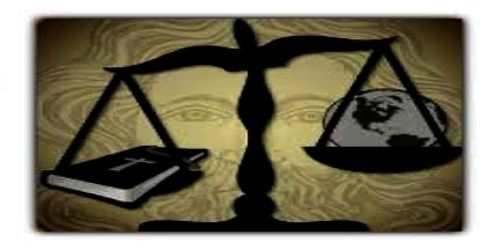Divine Law is the concept that the right to rule derives from God and that kings are answerable for their actions to God alone. Ex: James I of Scotland. This is a law that is believed to come directly from God.
Divine law is any law that is believed by religious adherents to come directly from the “will of God”, in contrast to man-made law. Unlike natural law, which is independent of human beings, divine laws are totally dependent upon human narrators and closely related to different cultures; they may change in human perception in time through new revelation, however, divine laws are eternal and constant, not subject to change. Divine laws are contained in sacred religious texts such as the Torah, the Holy Bible, and the Quran.
The significance of “divine law” in Scripture is that it is an authoritative expression of the holy character and mind of God, and His revealed will with respect to human conduct. It’s something we want others to do (we usually find excuses for not having to obey “divine laws” ourselves) so we invest it with the property of “divine law” so that those who don’t understand that it’s just meaningless words will feel compelled to obey it.

Introduction to Divine Law
Few people will doubt but that we live in a lawless and violent age where moral standards, once held sacred, are being abandoned with impunity. Drug abuse, sex abuse, violence, murder and rape plague our cities. Most will agree that lawlessness is a growing problem. People are becoming ungovernable. The rising cost of crime (for which it is the taxpayer ultimately footing the bill) is causing concern throughout society, and there seems little that the civil authorities can do to curb it.
An even more sinister trend is developing in the churches of Christianity. Here too we see lawlessness being preached and practiced. Millions of ministers and their congregations are now turning their backs on the law of God, and condoning behavior which, only a few decades ago, would have been openly condemned from the pulpit. This is a serious trend-for the church is supposed to teach true law and order. Yet, today we see prominent church leaders openly attacking the commandments of the Almighty God.
The influence of religious thought and doctrines on the establishment of law and order for the administration of the affairs of society is clearly apparent in the teachings of different religions. It should be noted that certain features of the various religious dispensations have been markedly different. For example, the special sphere of emphasis by some of the religious founders are known to be as follows:
- Moses is known as the law giver and the divine laws released by him greatly influenced the community of the faithful for many centuries.
- Buddha was a promoter of spirituality with special reference to prayer and meditation for the transformation of humankind. Even now the followers of Buddha put their energies into prayer and meditation as the means of spiritual enrichment.
- Christ encouraged love among the believers and the thrust of His mission was individual salvation. Probably that is one of the reasons for the deeply seated love of Christians for the figure of His Holiness Jesus Christ.
- Muhammad considered justice the fundamental pre-requisite and means of keeping order amongst the faithful. Hence he revealed His Book of Laws (Quran). Throughout the Islamic dispensation the Muslims rallied around the content and laws of Quran more than the personage of the prophet himself.
Conclusion
Divine law is any law that, according to religious belief, comes directly from the will of God, in contrast to man-made law. Like natural law it is independent of the will of man, who cannot change it. However it may be revealed or not, so it may change in human perception in time through new revelation. Divine law is eternal law, meaning that since God is infinite, then his law must also be infinite and eternal. In Thomas Aquinas’s Treatise on Law, divine law, as opposed to natural law, comes only from revelation or scripture, hence biblical law, and is necessary for human salvation. According to Aquinas, divine law must not be confused with natural law. Divine law is mainly and mostly natural law, but it can also be positive law.
Information Source:
















